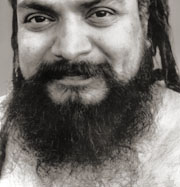The Requirement of
Personal Effort
There is nothing fatalistic about Yoga Vasishta. Attaining Self-realization and truly recognizing the nature of reality require personal effort — what Shivabalayogi often referred to as practice.
In the beginning of the very first chapter of the very first Book of Yoga Vasishta, slokas 4-7, Sage Agastya is asked, "Tell me, in your opinion, whether liberation results from a man’s acts or his knowledge or both?” Agastya replied, "As the birds fly in the air with both wings, so the highest state of emancipation is attained through both knowledge and acts. Neither our acts nor knowledge alone produces liberation, but both together are the means." Agastya then launches into a story to prove his point.
Further along in the work — but still very early — and immediately after Rama completes his speech on the vanity of everything the world has to offer, Vasishta hammers away on the need for personal effort. This theme is woven throughout the book.
There is no fate or karma. What we call fate is the result of prior effort. Although we have become habituated because of our past efforts (desires, attachments, vasanas), our efforts in the present time are more powerful than those of the past. (II.4-5)
“The presence of the Holy Light is not to be had by a teacher’s lectures or the teaching of scriptures. It is not the result of good acts or the company of holy men. It is the result of your own reasoning.” (V.12.17)
“[T]he pious acts of men, their riches and their friends are of no use for their salvation from the miseries of life. Only their own efforts are of use for the enlightenment of their soul.” (V.13.8)
“[T]he primary cause of spiritual light is a man’s intelligence, which is only gained by exertion of his mental powers. The secondary causes may be the blessing and grace of a god, but I wish you to prefer the former one for your salvation.” (V.43.11)
Vasishta’s teaching begins with the need for personal effort and not religion or teachers or good deeds. The book pretty much ends on the same subject. Rama asks whether there is any good in studying the scriptures or listening to spiritual teachers. Vasishta says they are not the means to understanding. “So it is, O mighty armed Rama, that the scriptures are not the means to divine knowledge. Scriptures are profuse with words; divine knowledge is beyond the reach of words.” VIB.196.10)
“Transcendental knowledge of God cannot be derived from the doctrines of the scriptures, or from the teachings of our preceptors. We can never know the unknowable One through gifts and charities, or by divine service and religious observances. These and other acts and rites are falsely said to be the causes of divine knowledge, which can never be attained by them.” (VIB.197.18-19)
Religion, scriptures, the company of the wise, and good deeds serve to create the opportunity to understand, but ultimately, one has to do the work alone. One has to become dispassionate, learn to be without desires, practice good conduct, study scriptures and learn from teachers. Then one has to internalize everything.
“Rama, you have heard whatever is worth hearing. You also know all that is worth knowing. Now I see there is nothing left worth communicating to you for your higher knowledge. Now you have to reconcile in yourself, by your best understanding, all that I have taught you and what you have read and learnt in the scriptures, and harmonize the whole for your guidance.” (VIB.203.20-21)
![]()

